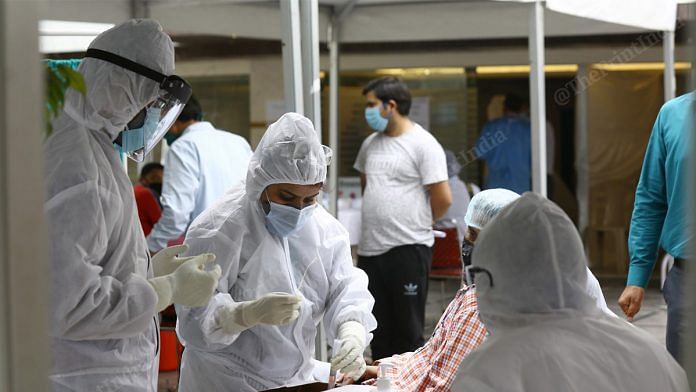New Delhi: The novel coronavirus has so far claimed over 284,096 lives across the world. But scientists are yet to fully understand Covid-19 and come up with a cure.
Here are some of the latest scientific efforts that teams around the globe are engaged in, which may help people learn how to fight the virus.
Levels of key enzyme in men makes them vulnerable
A large study of several thousand patients has shown that compared to women, men have a higher concentration of a key enzyme, angiotensin-converting enzyme 2 (ACE2), that enables the coronavirus to infect healthy cells.
The study may help explain why men are more vulnerable to Covid-19 than women.
Published in the European Heart Journal, the study shows that men have more ACE2 in their blood than women.
The study also found that patients suffering from heart failure who take drugs targeting the angiotensin-converting enzyme (ACE) inhibitors did not have higher concentrations of ACE2 in their blood.
According to researchers at the University Medical Center Groningen in The Netherlands, the findings do not support the discontinuation of these drugs among Covid-19 patients.
Also read: Pune’s National Institute of Virology develops indigenous rapid antibody test for Covid-19
US develops at-home saliva test to detect the virus
The US Food and Drug Administration (FDA) has given an emergency use authorisation for a SARS-CoV-2 coronavirus test that will allow people to collect their own saliva at home and send it to a lab for results.
The test, developed by researchers at the Rutgers University, allows coronavirus screening to be broadened, the researchers claimed. The standard method of Covid-19 testing using nose and throat swabs at a healthcare facility or testing location requires physical interaction with a professional.
This test will reduce the exposure of healthcare professionals to infected patients and allow hospitals to preserve precious PPE for use in patient care, instead of testing.
It can also help scale up the number of patients that can be tested in a day.
Database of CT scans will teach AI to diagnose Covid-19
Scientists have created a large database of chest CT scans belonging to patients with Covid-19 that will allow researchers to ‘train’ an artificial intelligence system to detect infections.
According to researchers from the Center for Diagnostics and Telemedicine at the Moscow Department of Health, the data set has over a 1,000 unique CT scans in which abnormalities have been marked and categorised by scientists.
The database is intended for developing artificial intelligence algorithms that can automatically help sort patients who need urgent attention. The tool could help doctors quickly spot “suspicious” areas on CT scans.
New clinical trial to pair remdesivir with arthritis drug
Scientists have launched a clinical trial to evaluate the safety and efficacy of a treatment regimen of the experimental drug remdesivir along the anti-inflammatory drug baricitinib to treat Covid-19.
The researchers involved in the trial hope to enroll 1,000 adults with Covid-19 in the US.
Recent research has shown that remdesivir can reduce the time coronavirus patients take to recover. In the new trial with baricitinib, all participants will receive either remdesivir or remdesivir with baricitinib.
Researchers will examine if adding baricitinib — which is to treat rheumatoid arthritis — to the remdesivir regimen can provide any additional benefit for patients, including reducing risk of death.
Also read: Coronavirus found in semen of young men with Covid-19



